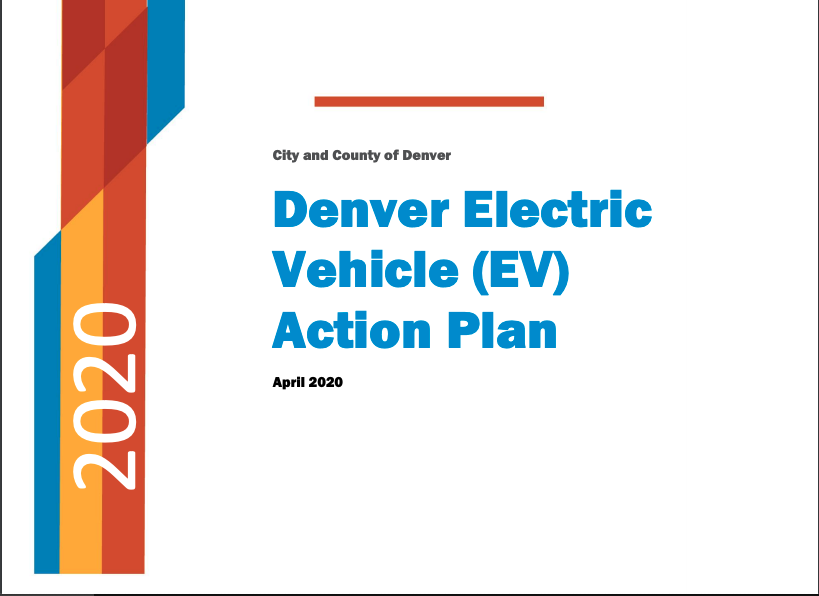Colorado's EV Plan Could Mean Blue Skies Ahead
 Thursday, May 21, 2020 at 4:06PM
Thursday, May 21, 2020 at 4:06PM  Grant Gerke
Grant Gerke This is a guest post from John Gartner, Vehicle Electrification and Mobility Consultant and Researcher. Originally posted on April 30, 2020.
 The State of Colorado may not have been one of the first states to push for leadership in electric vehicles (EVs), but the just-released Colorado Electric Vehicle Plan 2020 clearly signals that the state is focused on rapidly making up ground. Since 2017, Colorado has offered a generous $5,000 tax credit for those who purchase either a plug-in hybrid or battery electric vehicle. Upon taking office in January of 2019, Colorado Governor Jared Polis issued an executive order that the state should follow California’s Zero Emission Vehicles mandate, which will require that auto manufacturers sell EVs in specified quantities for model year 2023 and later vehicles.
The State of Colorado may not have been one of the first states to push for leadership in electric vehicles (EVs), but the just-released Colorado Electric Vehicle Plan 2020 clearly signals that the state is focused on rapidly making up ground. Since 2017, Colorado has offered a generous $5,000 tax credit for those who purchase either a plug-in hybrid or battery electric vehicle. Upon taking office in January of 2019, Colorado Governor Jared Polis issued an executive order that the state should follow California’s Zero Emission Vehicles mandate, which will require that auto manufacturers sell EVs in specified quantities for model year 2023 and later vehicles.
The EV plan targets 100% of light duty vehicles to be electric by 2050, and to have 940,000 EVs registered in Colorado in 2030. That ambitious goal will require Colorado EV sales to grow by approximately 50% annually, which will be made even more challenging due the economic slowdown caused by the COVID-19 pandemic. The broad plan outlines actions for the state to electrify its light, medium and heavy-duty fleets over time as advances in technology makes it feasible.
The plan addresses two of the biggest challenges in getting more drivers to go electric – education and the uncertainty of charging infrastructure availability. The plan specifies creating “approaches to communicating and educating the people of Colorado on the benefits of transportation electrification...” Even though EVs have been available for more than 10 years, consumer surveys have consistently shown that most of the car-buying public does not understand that EVs cost much less to operate and maintain in addition to offering great reliability and performance.
Colorado will also undertake research to “identify the type and number of charging stations needed across the state” to meet the requirements of the 2030 EV population. Colorado is already directly investing more than $10 million in fast charging corridors as well as spending the remainder of the $68 million from the Volkswagen settlement on transportation electrification. Fast charging is needed to enable traveling on Colorado’s interstates such as 25 and 70, and the state is coordinating with nearby states to enable long distance EV trips as part of the REV West initiative. Fast charging is also needed to enable EV drivers to take their vehicles to the state’s many mountain resort towns as the colder temperatures at higher altitudes and steep inclines to get their will more quickly deplete an EV’s batteries.
To address keeping down the cost of electricity for charging, the Colorado Energy Office (CEO) will work with utilities across the state on multiple fronts. The CEO will coordinate with utilities to: share best practices on EV-related utility rates, ensure that utilities’ transportation electrification programs comply with state requirements, and develop strategies that encourage potential site hosts to invest in charging infrastructure.
Car dealers, which thus far have been inconsistent at best and an impediment at worst in promoting the sales of EVs, are also addressed in the plan. To address this, the CEO and the Colorado Department of Transportation will develop a dealership engagement strategy as part of their education and outreach program. In 2020, Colorado passed Senate Bill SB20-167, which enables EVs to be sold directly in the state and without a dealership “..if the manufacturer makes only electric motor vehicles and has no franchised dealers of the dealer's line-make.” This will enable Tesla and the other startup EV companies to sell their vehicles in the state, and will therefore aid in growing EV sales.
Colorado is in part pushing for vehicle electrification to benefit the health of its citizens. Much of the state’s Front Range area to the east of the Rocky Mountains has been designated as an ozone nonattainment area by the federal Environmental Protection Agency, which requires the state to mitigate the poor air quality. Coincidentally, the nationwide the reduction in vehicle emissions due to the significant decline in vehicle miles traveled during the pandemic is clearing the air. Some groups are calling for any national economic stimulus to include support for EVs and infrastructure, which would be a sustainable method of re-energizing the economy.
While Colorado’s EV goals are ambitious, the 2020 EV Plan is a well thought out blueprint that recognizes and addresses the many business challenges and could lead to blue skies ahead.
For more information about Colorado's EV plans, visit Denver Metro Clean Cities Coalition or click here to visit John Gartner's profile on LinkedIN.


Reader Comments